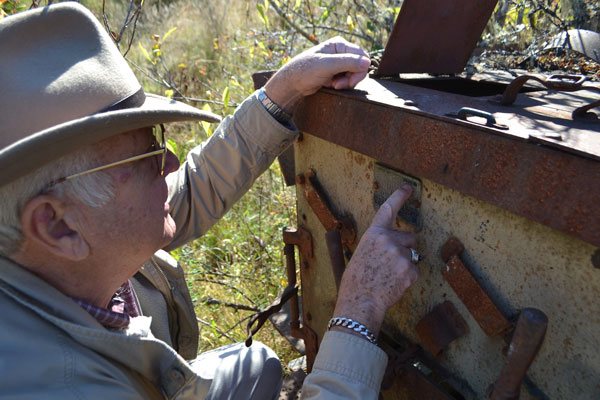David Melvin may have stumbled upon a piece of automotive and military history.
Melvin uncovered the rare World War I era tractor, which had been sitting for years in tall grass on his 18-acre property. The old tractor could have ties across the globe.
“It’s been a journey back in time,” Melvin said of his research on the tractor.
The tractor, a 1918 Maxwell Crawler, sits on top of a hillside with its gas tanks scattered downhill near what Melvin believes could have been a spot for either a logging mill and/or a distillery.
He points to spots where indentations in the ground indicate an explosion and pieces of boiler parts along with a logging cable.
Looking closer at the tractor’s manufacturer seals, Melvin reads aloud information from Diebolt, who made the upper carriage in 1917, and Maxwell, who built the motor in 1918.
Melvin said the tractor was ordered by Holt Manufacturing Company for wartime, but the demand overseas became too much so the machines were contracted out to the Reo Motor Car Company and Maxwell Motor Company.
Several thousand were made by the companies but few remain in existence today. “This is a lost piece of American and world history,” Melvin said.
One missing indicator that this could be a wartime tractor would be a “USA” stamp on the radiator tank. Allegedly, Holt didn’t brand its name on these for outsourced tractors; regardless, the radiator is one of the pieces missing from the engine.
Overseas the tractor mainly was used for towing vehicles and large weapons and helping lay roads through hard-to-reach places. Its 3-speed transmission and 4-cylinder Liberty engine didn’t move fast, but its 5-ton metal carcass seemed to pull things out of tough places easily. However, as the tractors were being fast-tracked for production, World War I ended, as did demand for the tractors, so Holt converted its inventory for civilian use.
Through his research, Melvin learned that when President Dwight D. Eisenhower was a 28-year old lieutenant colonel in the Army he traveled on a transcontinental convoy in 1919. The U.S. War Department wanted to know if the cross-country roads could handle long-distance emergency movement of motorized vehicles following World War I.
Eisenhower journaled about tractors like the Maxwell Crawler and how the tractors helped them traverse the at times hard-to-maneuver roads. This trip may have paved the way for Eisenhower signing into place the Federal-aid Highway Act years later.
It’s a long shot, but Melvin thinks this crawler could have made its way to the West Coast during this venture.
The Museum & Arts Center in the Sequim-Dungeness didn’t have any information on the crawler or Melvin’s home in its archives.
He’s contacted collectors and museums but they have turned up mostly dead ends.
“For a collector it could be priceless or worth the amount of its scrap metal,” he said.
With the cold and wet of winter upon Sequim, the tractor remains stuck in mud and any action on moving it will have to wait until spring.
Melvin remains optimistic he can find someone with more information on the crawler and someone who may be interested in the piece as a whole.
To contact Melvin, e-mail him at davidemelvin@aol.com.



